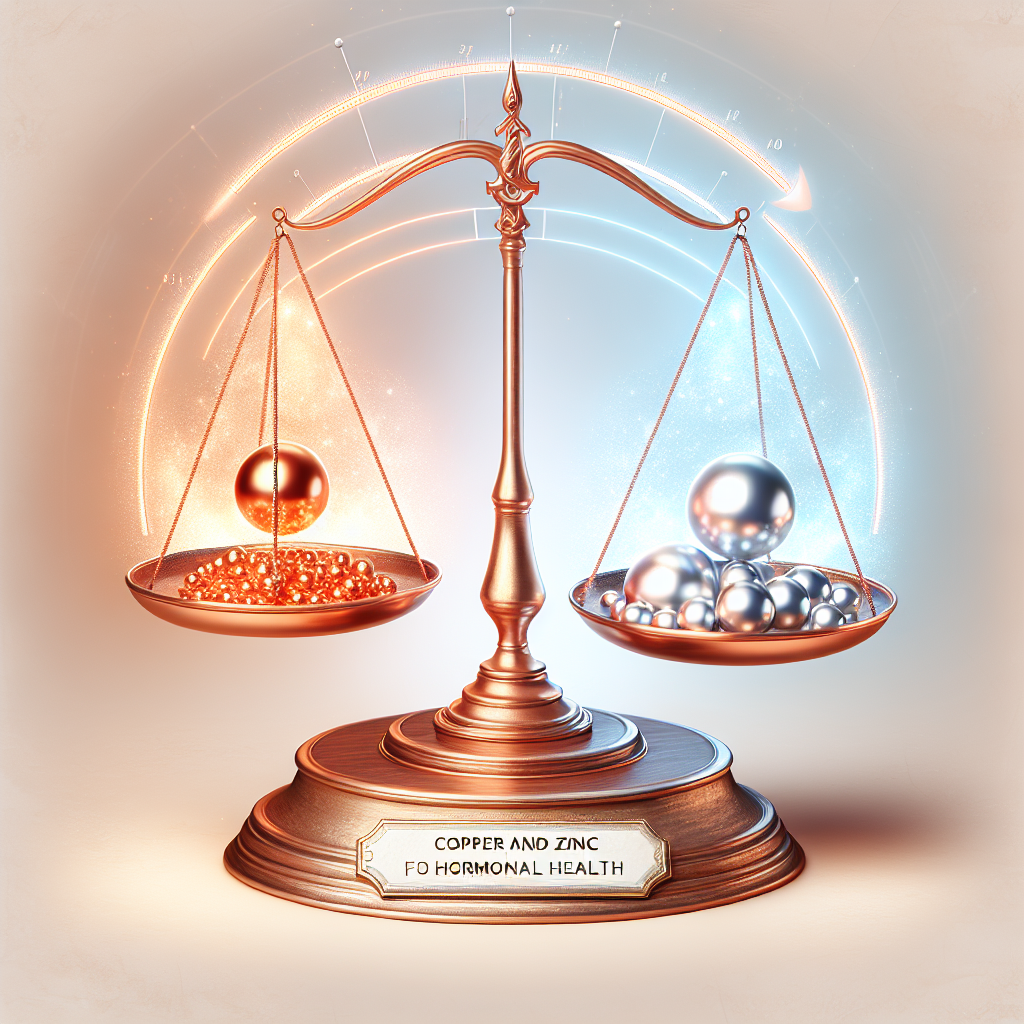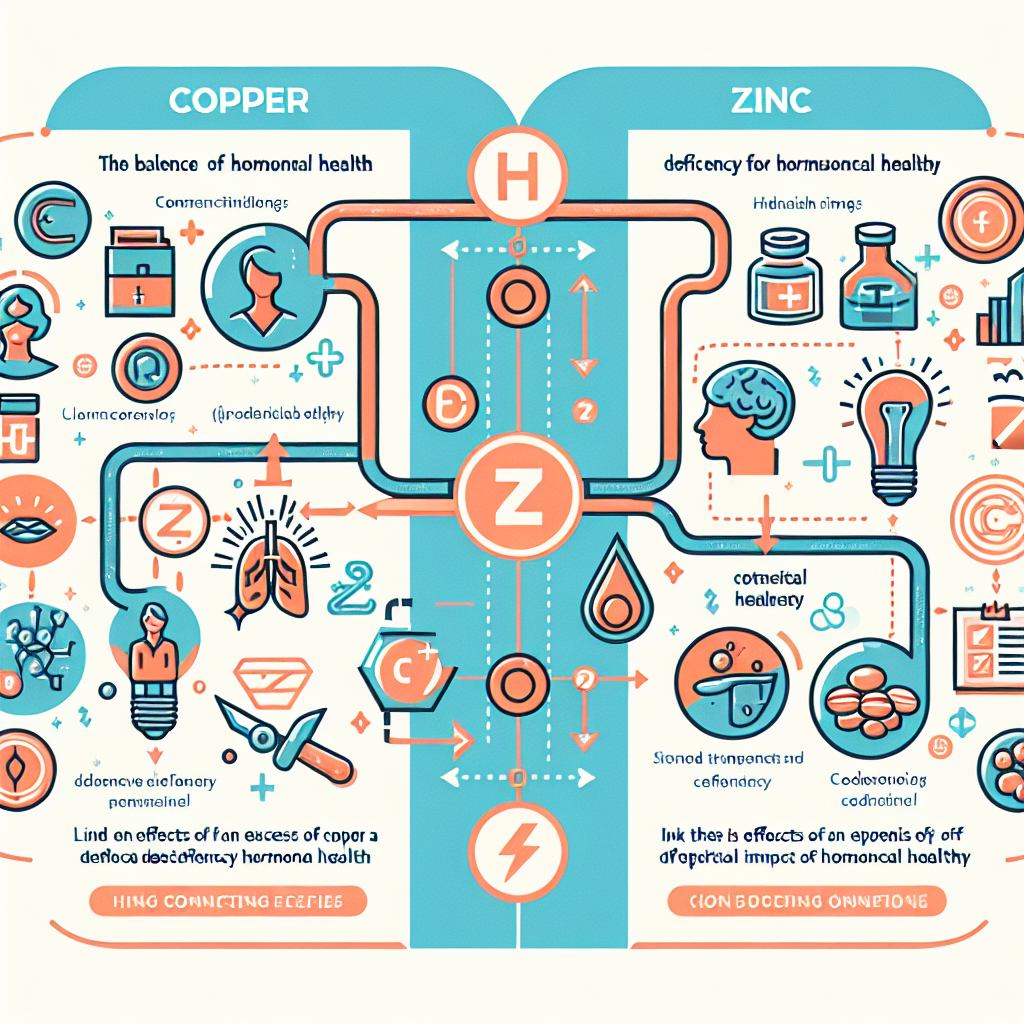How to Balance Copper and Zinc for Hormonal Health

Discover the secrets of balancing Copper and Zinc for optimal hormonal health today! Learn more about this crucial aspect of your wellbeing and take the first step towards a healthier you. Visit My Vibrant Vitality now!
Understanding the Role of Copper and Zinc in Hormonal Health
Understanding the role of copper and zinc in hormonal health is crucial for maintaining a balanced and healthy body. These two essential minerals play a significant role in the production and regulation of hormones, which are the body’s chemical messengers that control numerous physiological processes.
Copper, a trace mineral, is involved in the production of several hormones, including estrogen and progesterone. It also plays a role in the synthesis of neurotransmitters, which are chemicals that transmit signals in the brain. On the other hand, zinc is a vital mineral that aids in the production of hormones such as testosterone and insulin. It also supports the immune system and aids in cell growth and division.
However, maintaining a balance between copper and zinc is crucial for hormonal health. An imbalance between these two minerals can lead to a variety of health issues. For instance, an excess of copper can lead to symptoms such as fatigue, insomnia, depression, and skin problems, as it can interfere with the body’s ability to metabolize zinc. Conversely, a deficiency in zinc can lead to a weakened immune system, impaired wound healing, and hormonal imbalances.
To ensure a healthy balance of copper and zinc, it’s important to consider both dietary intake and supplementation. Foods rich in copper include organ meats, shellfish, nuts, and seeds, while zinc can be found in foods like oysters, beef, and pumpkin seeds. However, it’s important to note that the absorption of these minerals can be affected by other dietary factors. For example, high levels of phytic acid, found in grains and legumes, can inhibit the absorption of zinc.
In terms of supplementation, it’s crucial to consult with a healthcare professional before starting any new regimen. They can provide guidance on the appropriate dosage and monitor for any potential side effects. It’s also important to remember that while supplements can help to correct a deficiency, they should not replace a balanced diet.
Moreover, lifestyle factors can also impact the balance of copper and zinc in the body. Chronic stress, for instance, can deplete zinc levels, while excessive alcohol consumption can increase copper levels. Therefore, managing stress through practices such as meditation or yoga, and moderating alcohol intake, can help to maintain a healthy balance of these minerals.
In conclusion, understanding the role of copper and zinc in hormonal health is key to maintaining a balanced and healthy body. These two essential minerals are involved in the production and regulation of hormones, and an imbalance between them can lead to a variety of health issues. By considering dietary intake, supplementation, and lifestyle factors, it’s possible to ensure a healthy balance of copper and zinc, thereby supporting overall hormonal health.
Strategies for Balancing Copper and Zinc for Optimal Hormonal Function

The human body is a complex system that relies on a delicate balance of vitamins and minerals to function optimally. Among these, copper and zinc play a crucial role in maintaining hormonal health. These trace minerals are involved in various physiological processes, including the production and regulation of hormones. However, an imbalance in the levels of copper and zinc can lead to a myriad of health issues, including hormonal imbalances. Therefore, it is essential to understand how to balance copper and zinc for optimal hormonal function.
Copper and zinc are antagonistic minerals, meaning that an excess of one can lead to a deficiency of the other. This relationship is particularly important when it comes to hormonal health. Copper, for instance, is involved in the production of estrogen, a hormone that plays a vital role in the female reproductive system. On the other hand, zinc is crucial for the production of testosterone, a hormone that is essential for both male and female health.
An imbalance in the levels of these minerals can lead to hormonal imbalances. For instance, an excess of copper can lead to estrogen dominance, a condition characterized by high levels of estrogen relative to progesterone. This condition can lead to symptoms such as weight gain, mood swings, and irregular menstrual cycles. Conversely, a deficiency in zinc can lead to low testosterone levels, leading to symptoms such as fatigue, loss of muscle mass, and decreased libido.
Balancing copper and zinc levels, therefore, is crucial for maintaining hormonal health. One strategy for achieving this balance is through diet. Foods rich in copper include organ meats, shellfish, nuts, and seeds, while foods high in zinc include red meat, poultry, oysters, and fortified cereals. However, it’s important to note that the absorption of these minerals can be affected by other dietary factors. For instance, high levels of phytic acid, a compound found in grains and legumes, can inhibit the absorption of zinc.
Supplementation is another strategy that can be used to balance copper and zinc levels. However, it’s important to approach this method with caution. Over-supplementation can lead to toxicity, which can have serious health consequences. Therefore, it’s recommended to consult with a healthcare professional before starting any supplementation regimen.
In addition to diet and supplementation, lifestyle factors can also influence the balance of copper and zinc. Stress, for instance, can deplete zinc levels, while alcohol consumption can increase copper levels. Therefore, managing stress and moderating alcohol consumption can also help in maintaining the balance of these minerals.
In conclusion, balancing copper and zinc levels is crucial for hormonal health. This can be achieved through a balanced diet, careful supplementation, and a healthy lifestyle. However, given the complexity of the human body and the delicate balance of its various systems, it’s always recommended to consult with a healthcare professional before making any significant changes to your diet or lifestyle. By doing so, you can ensure that you’re taking the right steps towards maintaining your hormonal health and overall well-being.
The Impact of Copper and Zinc Imbalance on Hormonal Health
The human body is a complex system that relies on a delicate balance of vitamins and minerals to function optimally. Among these essential nutrients, copper and zinc play a pivotal role in maintaining hormonal health. However, an imbalance in the levels of these two minerals can lead to a myriad of health issues, including hormonal imbalances.
Copper and zinc are trace minerals that are vital for the production and regulation of hormones. Copper is involved in the production of estrogen and progesterone, two key female hormones, while zinc is essential for the production of testosterone, a crucial male hormone. However, these minerals also interact with each other in a delicate balance. Too much copper can inhibit the absorption of zinc, and vice versa. This interplay is crucial for hormonal health, as an imbalance can lead to a variety of symptoms such as fatigue, mood swings, and even fertility issues.
The impact of a copper and zinc imbalance on hormonal health can be profound. For instance, an excess of copper can lead to estrogen dominance, a condition characterized by high levels of estrogen relative to progesterone. This can result in symptoms such as weight gain, mood swings, and irregular menstrual cycles in women. On the other hand, a deficiency in zinc can lead to low testosterone levels in men, leading to symptoms such as fatigue, loss of muscle mass, and decreased libido.
Moreover, the balance of copper and zinc is also crucial for thyroid health. The thyroid gland, which regulates metabolism and energy production in the body, requires both copper and zinc for its function. An imbalance in these minerals can lead to thyroid disorders, which can manifest as symptoms such as weight gain, fatigue, and depression.
So, how can one ensure a balanced intake of copper and zinc for optimal hormonal health? The key lies in a balanced diet and, if necessary, supplementation. Foods rich in copper include organ meats, shellfish, nuts, and seeds, while zinc can be found in high amounts in meat, shellfish, legumes, and seeds. However, it’s important to note that the absorption of these minerals can be affected by other dietary factors. For instance, high intake of phytic acid, a compound found in grains and legumes, can inhibit the absorption of zinc.
In some cases, dietary changes may not be enough to correct a copper and zinc imbalance, and supplementation may be necessary. However, it’s crucial to approach supplementation with caution, as excessive intake of these minerals can lead to toxicity. Therefore, it’s always recommended to consult with a healthcare professional before starting any supplementation regimen.
In conclusion, the balance of copper and zinc is crucial for hormonal health. An imbalance in these minerals can lead to a variety of health issues, from mood swings and fatigue to more serious conditions like hormonal imbalances and thyroid disorders. Therefore, maintaining a balanced intake of these minerals through a healthy diet and, if necessary, supplementation, is key to ensuring optimal hormonal health.